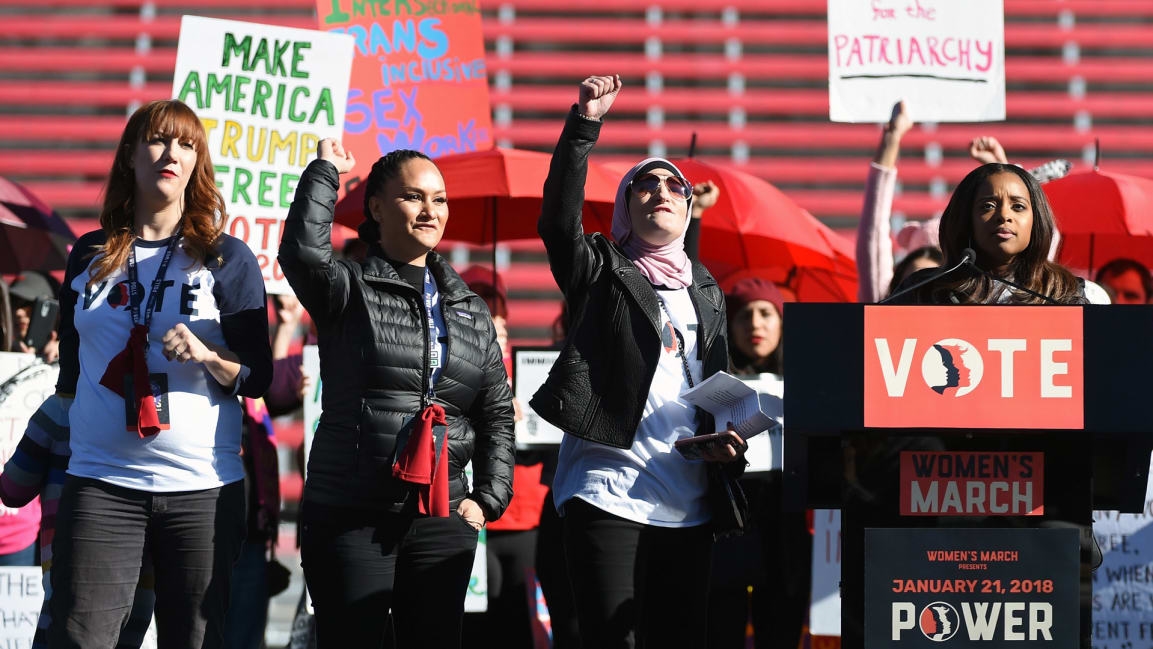We should boycott the Women’s March until its problematic leadership resigns
On Monday, Women’s March founder Teresa Shook publicly called for the organization’s leadership to step down and let others “restore faith” in the movement. It was the latest blow in what has become a barrage of criticism.
“Bob Bland, Tamika Mallory, Linda Sarsour, and Carmen Perez of Women’s March, Inc. have steered the Movement away from its true course,” Shook wrote on Facebook. “I have waited, hoping they would right the ship. But they have not. In opposition to our Unity Principles, they have allowed anti-Semitism, anti-LBGTQIA sentiment, and hateful, racist rhetoric to become a part of the platform by their refusal to separate themselves from groups that espouse these racist, hateful beliefs.”
She wasn’t alone. Alyssa Milano, Debra Messing, and a bevy of religious leaders and activists condemned what has baffled many: the cochairs’ unwillingness to denounce Nation of Islam leader Louis Farrakhan, whose shocking speeches cochair Tamika Mallory has attended.
To paraphrase Obama: How hard is it to say anti-Semites are bad?
Previously, Sarsour claimed anti-Semitism is “different than anti-black racism or Islamophobia because it’s not systemic.” More recently, she insinuated Jews are still too traumatized by the Holocaust to possess a clear idea of what constitutes anti-Semitism. You’re just being triggered, she Sarsour-splains.
A track record of deflection and hypocritical stances
Sarsour repeatedly issues non-apologies that deflect her actions. In response to Shook’s post, Sarsour attempted to minimize the founder’s involvement. “You put thousands and thousands of hours in fundraising, organizing, envisioning, building and strategizing for a movement that inspires the entire world and you are still at it 2 years later,” she wrote, “and the person who makes the demands and wants credit is the one who made the Facebook event.”
Even when it came to addressing Farrakhan, she responded poorly:
“Instead of coming together [after the Tree of Life shooting] as a country to call out white supremacy and the violence being inspired by this administration–the deflection went to a black man who has no institutional power,” wrote Sarsour of Farrakhan. “This is a feature of white supremacy.”
She seems to essentially be saying, “There are bigger fish to fry, so why take issue with us?”
Last week, newly elected Representative Ilhan Omar (D-MN) came under fire after reports surfaced that she supported a boycott on Israeli goods. Sarsour, in defense of Omar, was quick to lay blame at the feet of the right wing and “folks who masquerade as progressives but always choose their allegiance to Israel over their commitment to democracy and free speech.”
Accusations of dual allegiance is one of many tropes yielded over Jews. It’s old, tired, and has been used to downplay the Jewish community for centuries.
But should people be surprised? Sarsour has a history of misplaced blame. When the Women’s March Twitter account wished a happy birthday to Assata Shaku, one of the FBI’s most wanted terrorists, it raised eyebrows.
“Shakur is a cop-killer fugitive in Cuba,” responded CNN’s Jake Tapper. “This, ugly sentiments from @lsarsour & @dykemarchchi. Any progressives out there condemning this?”
Sarsour’s response? That Tapper joined “the ranks of the alt-right” to target her online.
By Sarsour’s logic, a cop killer can be hailed as a progressive activist, but “a Zionist cannot be a feminist.” It’s absurd. It’s the same logic, I assume, that had Mallory defend Bill Cosby but protest Kavanaugh?
“I’m not 100% sure about all the allegations, and I definitely feel an element of conspiracy in the mix,” Mallory wrote last summer, alongside a photo of the disgraced comedian headed to court with Cosby Show actress Keshia Knight Pulliam. “People who know me are very clear that I believe in loyalty . . . I’m talking about the loyalty that stands with a person who has stood with you, even if you are headed down to the police station to turn them in for murder, rape, or any other disgusting act.”
Women quickly responded, wondering why she chose to stand with the accuser instead of the countless victims who came forward?
Granted, the Women’s March has tried: It repeatedly condemns anti-Semitism and claims its leadership in no way supports the discrimination of Jews. It even raised money for Jewish causes. But such sentiments fall flat when Sarsour harbors a near obsession with criticizing Jewish support of Israel without ever offering the same critical eye to other countries, many of which decline basic human rights to women and LGBTQ citizens.
She defends Hamas actions without taking aim at its policies: Homosexuality is illegal under Hamas rule in the Gaza Strip, punishable by death. Meanwhile, she asks that Muslims not “humanize” Israelis.
And yet it is Sarsour who stresses, “Anyone who wants to call themselves an activist cannot be selective.”
For others (myself included), it’s hard to dismiss the image of Mallory clapping for Farrakhan, a man who calls Jews termites and spews anti-homosexual rhetoric.
The splintering of a movement
Already, many Women’s March chapters and affiliated groups pulled away from participating in the March. Earlier this month, the think tank for the Social Democratic Party of Germany withdrew its Human Rights Award to the Women’s March. There’s even a Change.org petition (that has exceeded its goal of 5,000 signatures) urging its leaders to step down and give it a chance to survive.
In its place, women launched their own independent marches. Some decided their time and money was better spent supporting organizations with clearer, more defined goals. Planned Parenthood, Emerge, and She Should Run are just a few that ran impressive campaigns in the last year.
Does that mean we should admit defeat and simply shrug off the Women’s March?
The Women’s March gathered over 3 million supporters in its inaugural event. That’s not a number we should easily dismiss.
Remember, these controversial women did not create the Women’s March. It started with a Facebook post that went viral. These women helped organize the marches, but they do not own it. This belongs to women across the globe. Divisive leaders oblivious to their own blind spots can and should be replaced. Only with their resignation can we support and participate in such a movement.
Back when I interviewed co-chair Bob Bland in 2016, she spoke of the March as an inclusive space championing the voices of those who felt they have been harassed or put on the sidelines as as result of the last election cycle.
“We want them to know that we are there for them collectively,” she explained. “We will show that we are powerful, our lives have meaning, and that we do make a difference, and we will make a difference by coming together.”
That’s great. Now how about we get some leaders who actually believe that?
(24)



